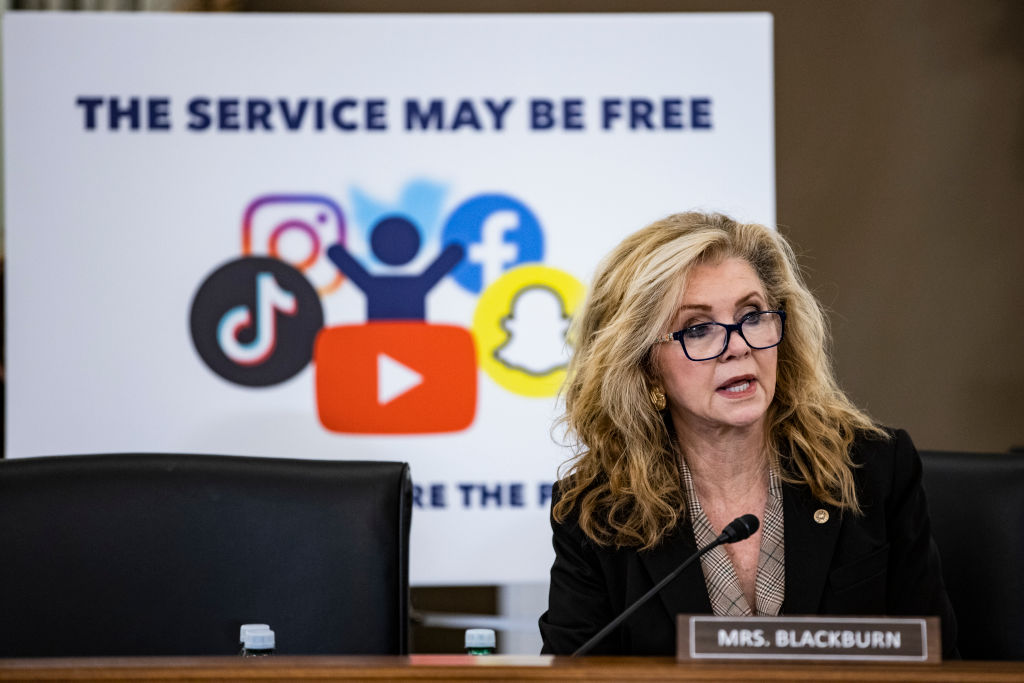Two bills that could change how websites interact with children and teens online—the Children and Teens’ Online Privacy Protection Act (COPPA 2.0) and the Kids Online Safety Act (KOSA)—stand a good chance to become law after approval from the Senate Commerce Committee prior to the August recess.
Both bills got close to the finish line last year before failing to make it into a year-end omnibus bill, but advocates for the kid-focused bills say public and media attention on children and teen mental health issues is creating more momentum.
“The biggest factor these bills have going for them is that people across the ideological spectrum have recognized that social media is harmful to kids, and that cuts across a lot of the typical ideological lines,” Clare Morell, a senior policy analyst at the conservative Ethics and Public Policy Center, tells The Dispatch.
COPPA 2.0, introduced by Sens. Ed Markey, a Democrat, and Bill Cassidy, a Republican, would revamp a law originally passed a quarter-century ago by raising the age at which companies are legally allowed to collect data from a user 13 to 16 years old and making it easier for the Federal Trade Commission and state attorneys general to hold tech companies liable for failing to adhere to the privacy rules for accounts held by minors. KOSA, the brainchild of Sens. Richard Blumenthal, a Democrat, and Marsha Blackburn, a Republican, is more focused on safety, creating a new “duty of care” for platforms to “prevent and mitigate” harms to minors—from content pushing kids toward self-harm or sexual exploitation, for example.
The privacy bill and the safety bill are not formally linked, but thus far, they have been moved through the legislative process as a pair. KOSA in particular looks somewhat different than it did last year. Perhaps most notably, the committee approved an amendment offered by GOP Sen. John Thune that would require platforms to notify users when content is being filtered by an algorithm but would also narrow the definition of what is considered a “covered platform”—excluding, for example, a website owned by a company with fewer than 500 employees.
The legislation has received criticism from across the ideological spectrum. Some progressive groups, including the American Civil Liberties Union (ACLU), worry that KOSA will hinder LGBT teens’ ability to access sex ed information and other resources online, often citing commentary from the Heritage Foundation about how lawmakers “must guard against the harms of sexual and transgender content.” (The Heritage Foundation has also published commentary arguing that KOSA is too friendly to gender ideology.) And NetChoice, a trade association of tech companies working to “make the Internet safe for free enterprise and free expression,” is opposed to the bills on those grounds, arguing that they would lead to more surveillance, not less.
But the size of the broad, bipartisan coalition of senators that supports the bills suggests that lawmakers are content to take those criticisms in stride, or at least make small adjustments to accommodate them: KOSA now has 43 cosponsors.
If the Senate passes the bills this fall, Morell says she would expect the House to act quickly to send them to the president’s desk. Given that he has highlighted concerns about Big Tech and kids in two consecutive State of the Union addresses, he’d be likely to sign them. And that could be just the beginning. KOSA includes a provision directing the FTC to study possible effective methods of age verification for online platforms. And Democratic Sens. Brian Schatz and Chris Murphy and Republicans Katie Britt and Tom Cotton introduced a bill earlier this year to make age limits for social media more enforceable and require parental consent for minors to open accounts.
“My biggest hope is that these bills just pave the way for more bills to come after them,” Morell says.
The Shadow of Impeachment
Former President Donald Trump appeared in federal court Thursday less than half a mile from where Proud Boys first breached the perimeter of the U.S. Capitol complex on January 6, 2021. He pleaded not guilty to all four conspiracy- and obstruction-related felony charges surrounding his efforts to overturn the results of the 2020 election.
Even while on recess, many congressional members of both parties leapt at the chance to comment on the new indictment.
Twenty-four House Democrats, led by California Rep. Adam Schiff, have asked the federal judge overseeing the administration of Trump’s trial to allow the proceedings to be televised, Axios reported on Thursday, ostensibly for the sake of transparency.
Predictably, Republican leaders in the lower chamber have struck a different tone. GOP conference chair Rep. Elise Stefanik called the indictment a “disgraceful non-stop witch hunt by Biden’s corrupt DOJ.” Speaker Kevin McCarthy’s language hasn’t been quite as forceful, but he has cast aspersions on the fairness of the process, accusing Attorney General Merrick Garland and the Justice Department of perpetrating what Republicans have come to refer to as a “two-tiered system of justice.”
“It seems as though every time Trump goes higher in the poll, he gets a new indictment,” McCarthy said Thursday. “It seems to me, after you learn the real dealings behind the Bidens, the next day he gets indicted.”
Trump’s most recent indictment did indeed come down the day after the House Oversight Committee met with a former Hunter Biden business associate, Devon Archer, behind closed doors, adding fresh detail to a growing body of knowledge about influence peddling by the president’s son.
In light of complaints about the “two-tiered” justice system, McCarthy has continued to emphasize the possibility of an impeachment inquiry into the president himself—an investigation that, if it occurs, could coincide with Trump’s federal trial for conduct he was impeached over. But even as some House Republicans become more eager to eventually impeach Biden, their investigations haven’t yet unearthed clear-cut evidence of a “high crime or misdemeanor.”
That may change, but for now congressional Republicans are divided, with even stridently anti-Biden senators wary of yet another impeachment effort: “It’s not good for the republic to keep impeaching presidents and indicting presidents,” Kentucky Sen. Rand Paul said on Fox News last week.






Please note that we at The Dispatch hold ourselves, our work, and our commenters to a higher standard than other places on the internet. We welcome comments that foster genuine debate or discussion—including comments critical of us or our work—but responses that include ad hominem attacks on fellow Dispatch members or are intended to stoke fear and anger may be moderated.
With your membership, you only have the ability to comment on The Morning Dispatch articles. Consider upgrading to join the conversation everywhere.